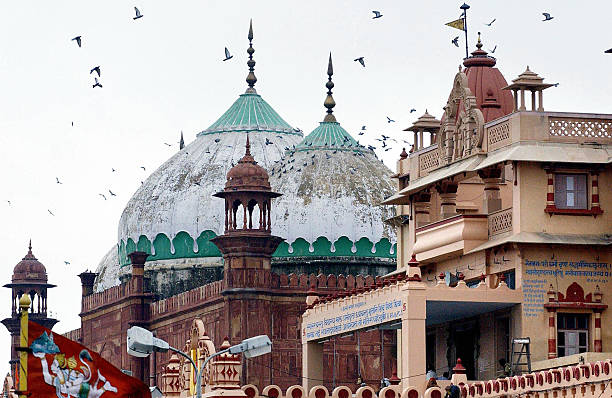A suit to claim ownership of a ‘Krishna Janmabhoomi’ at the site of a mosque has been filed in a Mathura local court, Bar and Bench has reported.
The fever of Ram Janmabhoomi has passed after the foundation stone for the temple was laid in the midst of the pandemic in a huge ‘Bhoomi Pujan’ function, bringing to conclusion the illegal demolition of the Babri Masjid and the many Muslim lives that were lost in the riots that followed.
As a result, the forces of Hindutva were scrambling to find a new distraction, as hundreds across the country have come out on the streets to protest the government’s new agricultural laws.
Ranjana Agnihotri, one of the advocates who argued in the Ayodhya Title Suit before the Lucknow High Court, has now filed a suit seeking to claim ownership over the land on which the Shahi Idgah Masjid is built. The suit seeks the removal of the mosque.
Making a joke out of the law of the country, Agnihotri and six others have filed the suit on behalf of ‘Shri Krishna Virajman’, the Hindu deity. The lawyers have argued that ‘Shri Krishna’ can be the plaintiff as justified by ‘Hindu Law’.
The suit argues that Aurangzeb who ruled over the country from 31.07.1658 to 3.03.1707 issued orders for demolition of large number of Hindu religious places, being a “staunch follower of Islam”.
The suit challenges the 1968 agreement between the Shri Krishna Janmabhoomi Trust and the Idgah committee in which the ownership of the land was granted to the trust, and the management rights of the Masjid left with the Idgah committee, hence depriving the Trust of the legal right to stake a claim on the Masjid.
This agreement was also challenged by Manohar Lal Sharma in 1993, as the Idgah mosque came under the radar after the demolition of the Babri Masjid.
Sharma had also challenged the Places of Religious Worship Act of 1991, which was enacted when VHP and other RSS organizations began to launch campaigns similar to that against Babri Masjid, against Gyanvapi mosque in Varanasi and the Shahi Idgah in Mathura. This act froze the status of any place of worship as it existed on August 15, 1947.
Hindu militant activists and advocates should pay heed to this law, since if one were to ignore it, the people of the country could very well challenge the existence of thousands of Hindu temples that have been built after the historical demolition of Buddhist and Jain sites of worship.





























